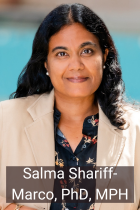Physical Activity and Breast Cancer: Pathways Study Results and Clinical Recommendations
Thursday, October 30, 2025
How does physical activity impact breast cancer survivorship? What is the best way to incorporate exercise after treatment? How do the latest research findings translate into clinical recommendations for your daily life?
Get these questions and more answered in our hour-long free webinar brought to you by Zero Breast Cancer at Collaborative for Health & Environment and Kaiser Permanente Northern California Division of Research.
In this webinar, Rikki Cannioto, PhD, EdD, MS (Roswell Park Comprehensive Cancer Center), shares findings from the Pathways Study, focusing on the relationship between physical activity, healthy lifestyles, and breast cancer outcomes. Holly Rodriguez, PT, MPT, CLT-LANA (Kaiser Permanente Vacaville), shares practical tips and expert guidance for physical activity after a breast cancer diagnosis, including how to safely start, maintain, and modify exercise routines.
Lianna Hartmour, MA, NBC-HWC (Zero Breast Cancer at Collaborative for Health & Environment), hosts the forum and leads the Q&A session where we will be joined by Pathways Principal Investigator Larry Kushi, ScD (Kaiser Permanente Northern California Division of Research).
Featuring
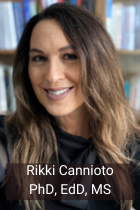
Dr. Rikki Cannioto , PhD, EdD, MS, is an exercise scientist and cancer epidemiologist at Roswell Park Comprehensive Cancer Center in Buffalo, New York. Her research focuses on understanding how modifiable lifestyle factors including physical activity, diet, and body composition impact tumor immunity and survival outcomes in women diagnosed with breast and ovarian cancer.
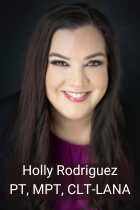
Holly Davis Rodriguez, PT, MPT, CLT-LANA, has been a physical therapist for 21 years. She practices in an outpatient clinic at Kaiser Permanente in Vacaville, California. In 2008, Holly became a Certified Lymphedema Therapist through the Norton School of Lymphatic Therapy and received her LANA certification in 2013. In 2018, she became a Certified Oncology Rehabilitation Specialist through the Physiological Oncology Rehabilitation Institute (PORi) and in 2022, became Board-Certified in Oncologic Physical Therapy through the American Board of Physical Therapy Specialties.
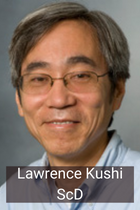
Lawrence Kushi, ScD, is the Director of Scientific Policy at the Kaiser Permanente Northern California Division of Research. He is a nutritional and cancer epidemiologist whose research focuses on lifestyle and other factors in cancer survivorship, prognosis and outcomes. He leads the Pathways Study, a prospective cohort study of women diagnosed with breast cancer, begun as an investigator-initiated research grant and now supported through the NCI’s cancer epidemiology cohort infrastructure program. In addition to Pathways and related research, Dr. Kushi leads projects in outcomes of ovarian cancer and adolescent and young adult cancers, and is a co-investigator on other research projects. He also led the NCI-supported Cancer Research Network. A graduate of Amherst College and the Harvard School of Public Health, Dr. Kushi was at the Fred Hutchinson Cancer Research Center, the University of Minnesota and was the Vahlteich Professor of Human Nutrition at Columbia University.
Moderator
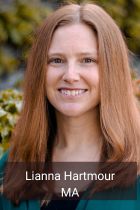
Lianna Hartmour, MA, NBC-HWC, is Zero Breast Cancer Program & Communications Director at Collaborative for Health & Environment. She leads Zero Breast Cancer's Survivorship, Health & Wellness Coaching, and Next Generation Risk Reduction Programs. She has facilitated several community groups, including the Pathways Study Community Advisory Board (CAB). She works with the CAB to produce webinars and newsletter articles to make the Pathways Study findings useful and accessible to cohort members, breast cancer survivors more broadly, and those who care for them. She is also a certified Health & Wellness Coach and serves clients before, during, and after breast cancer.
Breast Cancer and Bone Health: Pathways Study Findings and Clinical Recommendations
Thursday, March 6, 2025
How does breast cancer treatment impact bone health? What is the risk for developing osteoporosis or experiencing a fracture? What can breast cancer survivors do to protect and improve their bone health? Get these questions and more answered in our hour-long free webinar brought to you by Zero Breast Cancer at Collaborative for Health & Environment and Kaiser Permanente Northern California Division of Research.
In this webinar, Marilyn Kwan, PhD (Kaiser Permanente Northern California Division of Research), will speak about findings from the Pathways Bone Health Study, which focused on evaluating the potential risk of developing osteoporosis or experiencing a fracture in women with breast cancer who took hormonal therapy for treatment. Amber Wheeler, MD (Kaiser Permanente San Francisco), will speak about bone health management, including how to prevent and treat osteoporosis and bone fractures.
Lianna Hartmour, MA (Zero Breast Cancer at Collaborative for Health & Environment), will host the forum and lead the Q&A with the two researchers and Pathways Principal Investigator Larry Kushi, ScD (Kaiser Permanente Northern California Division of Research).
We hope you will join us to learn more about bone health, ask questions, and offer your ideas for how research can improve health.
Featuring

Marilyn Kwan, PhD, is a Research Scientist at the Division of Research, Kaiser Permanente Northern California. She graduated from University of California, Berkeley, with her PhD in Epidemiology followed by a postdoctoral fellowship. Dr. Kwan joined the Division of Research in 2005, where her current research focus is breast and bladder cancer prognosis and survival. Specifically, her interests include lifestyle and molecular factors and their associations with cancer recurrence, survival, and quality of life. She also studies the long-term health effects of cancer treatment, including lymphedema, fractures, and cardiovascular disease.
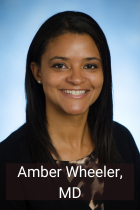 Dr. Amber Wheeler is a general endocrinologist at Kaiser Permanente San Francisco Medical Center. She is the medical center regional clinical lead for falls and fracture prevention and is the San Francisco osteoporosis champion and clinical lead for the fracture prevention service. She is on the Core Faculty for the Kaiser Permanente San Francisco Internal Medicine residency program focusing on diversity, equity and inclusion, resident mentoring and career development, and subspecialty education.
Dr. Amber Wheeler is a general endocrinologist at Kaiser Permanente San Francisco Medical Center. She is the medical center regional clinical lead for falls and fracture prevention and is the San Francisco osteoporosis champion and clinical lead for the fracture prevention service. She is on the Core Faculty for the Kaiser Permanente San Francisco Internal Medicine residency program focusing on diversity, equity and inclusion, resident mentoring and career development, and subspecialty education.

Lawrence Kushi, ScD, is the Director of Scientific Policy at the Kaiser Permanente Northern California Division of Research. He is a nutritional and cancer epidemiologist whose research focuses on lifestyle and other factors in cancer survivorship, prognosis and outcomes. He leads the Pathways Study, a prospective cohort study of women diagnosed with breast cancer, begun as an investigator-initiated research grant and now supported through the NCI’s cancer epidemiology cohort infrastructure program. In addition to Pathways and related research, Dr. Kushi leads projects in outcomes of ovarian cancer and adolescent and young adult cancers, and is a co-investigator on other research projects. He also led the NCI-supported Cancer Research Network. A graduate of Amherst College and the Harvard School of Public Health, Dr. Kushi was at the Fred Hutchinson Cancer Research Center, the University of Minnesota and was the Vahlteich Professor of Human Nutrition at Columbia University.
Moderator

Lianna Hartmour, MA, NBC-HWC, is Zero Breast Cancer Program & Communications Director at Collaborative for Health & Environment. She leads Zero Breast Cancer's Survivorship, Health & Wellness Coaching, and Next Generation Risk Reduction Programs. She has facilitated several community groups, including the Pathways Study Community Advisory Board (CAB). She works with the CAB to produce webinars and newsletter articles to make the Pathways Study findings useful and accessible to cohort members, breast cancer survivors more broadly, and those who care for them. She is also a certified Health & Wellness Coach and serves clients before, during, and after breast cancer.
Breast Cancer, Diet, and Heart Health: How the Pathways Study is Informing Lifestyle Medicine
Tuesday, October 29, 2024
Breast cancer survivors have a higher risk of heart disease. How does diet matter for breast cancer survivors’ heart health? What practical steps can improve breast cancer survivors’ long term health? Get these questions and more answered in our hour-long free webinar brought to you by Zero Breast Cancer at Collaborative for Health & Environment and Kaiser Permanente Northern California Division of Research.
Isaac Ergas, PhD (Kaiser Permanente Northern California Division of Research), will highlight how recent findings from the Pathways Study reveal the role of diet quality in lowering the risk of heart disease in breast cancer survivors. Robin Zwerling Baltrushes, MD (Kaiser Permanente), will explore the role of lifestyle medicine in supporting survivors and provide practical solutions for improving long-term health.
Lianna Hartmour, MA (Zero Breast Cancer at Collaborative for Health & Environment), will host the forum and lead the Q&A with the two researchers and Pathways Principal Investigator Larry Kushi, ScD (Kaiser Permanente Northern California Division of Research).
We hope you will join us to learn more about heart health and diet, ask questions, and offer your ideas for how research can improve health.
Featuring
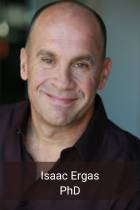
Isaac Ergas, PhD, is a Staff Scientist at the Kaiser Permanente Northern California Division of Research. His research explores dietary, lifestyle, and behavioral risk factors for breast and bladder cancer, investigating how nutrients, food, and overall dietary pattern levels influence the mechanisms that impact cancer progression and survival. Dr. Ergas earned his PhD in Epidemiology from the University of California, Berkeley. His dissertation examined the role of diet in breast cancer survivorship in participants of the Pathways Study, a longitudinal prospective cohort of women diagnosed with invasive breast cancer between 2005 and 2013. He also holds a Masters of Public Health from the University of California, Berkeley. He previously earned a Masters of Fine Arts in Film and Television Production at the University of Southern California.
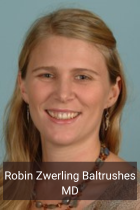
Dr. Robin Zwerling Baltrushes, MD, is the East Bay Medical Director for Lifestyle Medicine and the East Bay Chief for Health Education at Kaiser Permanente. She has been practicing at the Oakland Medical Center since 2012, after completing her Family Medicine Residency at Contra Costa Regional Medical Center. Dr. Zwerling Baltrushes leads initiatives integrating lifestyle interventions into clinical care, including a 12-week class focused on improving health through diet, exercise, and mindfulness. Dr Zwerling Baltrushes’ work focuses on reducing healthcare disparities, particularly in underserved communities. Her clinical work is in the breast surgery clinic at Oakland Kaiser. There she works closely with hereditary cancer patients and breast cancer survivors, a role that is deeply important to her.

Lawrence Kushi, ScD, is the Director of Scientific Policy at the Kaiser Permanente Northern California Division of Research. He is a nutritional and cancer epidemiologist whose research focuses on lifestyle and other factors in cancer survivorship, prognosis and outcomes. He leads the Pathways Study, a prospective cohort study of women diagnosed with breast cancer, begun as an investigator-initiated research grant and now supported through the NCI’s cancer epidemiology cohort infrastructure program. In addition to Pathways and related research, Dr. Kushi leads projects in outcomes of ovarian cancer and adolescent and young adult cancers, and is a co-investigator on other research projects. He also led the NCI-supported Cancer Research Network. A graduate of Amherst College and the Harvard School of Public Health, Dr. Kushi was at the Fred Hutchinson Cancer Research Center, the University of Minnesota and was the Vahlteich Professor of Human Nutrition at Columbia University.
Moderator

Lianna Hartmour, MA, NBC-HWC, is Zero Breast Cancer Program & Communications Director at Collaborative for Health & Environment. She leads Zero Breast Cancer's Survivorship, Health & Wellness Coaching, and Next Generation Risk Reduction Programs. She has facilitated several community groups, including the Pathways Study Community Advisory Board (CAB). She works with the CAB to produce webinars and newsletter articles to make the Pathways Study findings useful and accessible to cohort members, breast cancer survivors more broadly, and those who care for them. She is also a certified Health & Wellness Coach and serves clients before, during, and after breast cancer.
Genetics and Breast Cancer: Learnings From the Pathways Study and Clinical Practice
Thursday, April 25, 2024
Do lifestyle and environment matter for genetic risk? How do genes impact breast cancer risk and treatment? How is genetic information used by physicians? Get these questions and more answered in our hour-long free webinar brought to you by Zero Breast Cancer and Kaiser Permanente Northern California Division of Research.
Christine Ambrosone, PhD (Roswell Park Comprehensive Cancer Center), will explain how common genetic variations may impact breast cancer risk when they occur with known lifestyle and environmental cancer risk factors and how the Pathways Survivorship Study has ongoing and planned research on these types of genetic variations. Leslie Manace Brenman, MD, MPhil (Kaiser Permanente), will explain how genetic testing is relevant for precision medicine to benefit people with hereditary cancer risk and their relatives, and for personalized information regarding tumor prognosis and treatment options.
Lianna Hartmour, MA (Zero Breast Cancer), will host the forum and lead the Q&A with the two researchers and Pathways Principal Investigator Larry Kushi, ScD (Kaiser Permanente Northern California Division of Research).
We hope you will join us to learn more about genetics & breast cancer, ask questions, and offer your ideas for how research can improve health.
Featuring
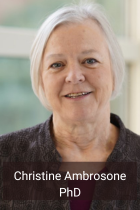
Christine Ambrosone, PhD is a Distinguished Professor of Oncology at Roswell Park Comprehensive Cancer Center in Buffalo, New York. She is an epidemiologist with interest and expertise in the molecular underpinnings of cancer and cancer outcomes. She has been collaborating with Dr. Kushi on the Pathways Study since it’s inception and is particularly interested in how genetic factors may interact with exposures to impact treatment outcomes. In addition to her research on breast cancer outcomes, she has been leading research to understand which Black women are more likely than U.S. other groups to be diagnosed with more aggressive breast tumors and to die from those cancers.
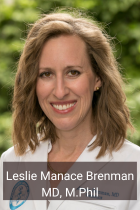
Leslie Manace Brenman, M.D., M.Phil., is a practicing medical geneticist at Kaiser Permanente Oakland Medical Center Department of Genetics, KP Northern California Regional Director for Precision Medicine & Genomics, Hereditary Cancer, and Assistant Chief for Regional Genetics Screening & Tracking where she leads multidisciplinary teams through transformational change in population care delivery. Dr. Manace’s research interests focus on innovation in delivery science, and she is a member of the Kaiser Permanente Northern California Investigational Review Board and Co-Chair of the Research Quality and Compliance Committee. She is an Assistant Clinical Professor at the University of California, San Francisco. She has participated in committees and published and spoken on scientific ethical legal and social implications, as well as heath information technology in Clinical Genetics and Genomic Medicine in the US and internationally.

Lawrence Kushi, ScD, is the Director of Scientific Policy at the Kaiser Permanente Northern California Division of Research. He is a nutritional and cancer epidemiologist whose research focuses on lifestyle and other factors in cancer survivorship, prognosis and outcomes. He leads the Pathways Study, a prospective cohort study of women diagnosed with breast cancer, begun as an investigator-initiated research grant and now supported through the NCI’s cancer epidemiology cohort infrastructure program. In addition to Pathways and related research, Dr. Kushi leads projects in outcomes of ovarian cancer and adolescent and young adult cancers, and is a co-investigator on other research projects. He also led the NCI-supported Cancer Research Network. A graduate of Amherst College and the Harvard School of Public Health, Dr. Kushi was at the Fred Hutchinson Cancer Research Center, the University of Minnesota and was the Vahlteich Professor of Human Nutrition at Columbia University.
Moderator

Lianna Hartmour, MA, is Programs & Communications Director at Zero Breast Cancer. She leads Zero Breast Cancer's Survivorship, Health & Wellness Coaching, and Next Generation Risk Reduction Programs. She has facilitated several community groups, including the Pathways Study Community Advisory Board (CAB). She works with the CAB to produce webinars and newsletter articles to make the Pathways Study findings useful and accessible to cohort members, breast cancer survivors more broadly, and those who care for them. She is also a certified Health & Wellness Coach and serves clients before, during, and after breast cancer.
People, Places, and Breast Cancer: The Pathways Study and how our communities impact survival and quality of life
Thursday, September 21, 2023
Two researchers with the Pathways Breast Cancer Survivorship Study will discuss how the communities we live in play an important role in the differences in length and quality of life after a breast cancer diagnosis.
Candyce Kroenke, ScD (Kaiser Permanente Northern California Division of Research), will explain how social support and social networks affect breast cancer outcomes and describe her team’s research that helps to understand who struggles with support and create opportunities to improve it within the health system and the community. Salma Shariff-Marco, PhD (University of California, San Francisco & Helen Diller Comprehensive Cancer Center), will share how her team defined and described neighborhoods in the Pathways Study to see how place impacts breast cancer outcomes and how they are using that to look for ways communities might reduce stress and improve quality of life. Both want to hear your ideas about how to use their research to promote health!
After their presentations, they will be joined by Pathways Study Principal Investigator Larry Kushi, ScD, oncologist Raymond Liu, MD, (Director of Cancer Survivorship at Kaiser Permanente San Francisco) and Pathways Study participants who serve on the Pathways Community Advisory Board. We will have more than 30 minutes for your input and questions.
This webinar is for anyone interested, including:
- People diagnosed with breast cancer, including metastatic disease
- Those who care for or about someone diagnosed with breast cancer
- Healthcare providers and social workers serving people with cancer
- Public health professionals and researchers
We hope you will join us online to learn more about these Pathways Studies, to share your ideas with our research partners, and to ask your questions. Register here.
Featuring
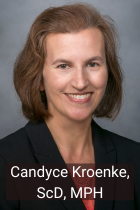 Candyce Kroenke, ScD, MPH, is a Senior Research Scientist at the Kaiser Permanente Northern California Division of Research (DOR) and Professor at the Kaiser Permanente Bernard J Tyson School of Medicine. Her research focuses on social determinants related to differences in cancer survival, including social networks, race/ethnicity, and socioeconomic status. In addition to understanding these relationships, Dr. Kroenke examines behavioral, biological, and treatment-related factors underlying associations. Her current studies evaluate the influence of social networks on breast cancer treatment and prognosis; the role of social networks in racial disparities in breast cancer treatment and survival; and the role of multilevel social networks in associations between immigrant status, health behaviors, and breast cancer outcomes. Her team is developing an electronic health record-based tool to identify breast cancer patients at risk of low social support.
Candyce Kroenke, ScD, MPH, is a Senior Research Scientist at the Kaiser Permanente Northern California Division of Research (DOR) and Professor at the Kaiser Permanente Bernard J Tyson School of Medicine. Her research focuses on social determinants related to differences in cancer survival, including social networks, race/ethnicity, and socioeconomic status. In addition to understanding these relationships, Dr. Kroenke examines behavioral, biological, and treatment-related factors underlying associations. Her current studies evaluate the influence of social networks on breast cancer treatment and prognosis; the role of social networks in racial disparities in breast cancer treatment and survival; and the role of multilevel social networks in associations between immigrant status, health behaviors, and breast cancer outcomes. Her team is developing an electronic health record-based tool to identify breast cancer patients at risk of low social support.
Salma Shariff-Marco, PhD, MPH, is an Associate Professor in the Department of Epidemiology & Biostatistics at the University of California, San Francisco. Her research focuses on understanding the role of social drivers of health in shaping and perpetuating cancer health disparities. One main area of focus is on place and health, evaluating how neighborhood characteristics (e.g., social, built, and physical environment attributes) and place differences may shape cancer-related health behaviors and outcomes across the cancer continuum (from risk factors to survivorship). Dr. Shariff-Marco’s research has also focused on understanding how race/ethnicity, socioeconomic status, and immigration impact health disparities. She studies self-reported experiences of discrimination and its impact on health behaviors and outcomes. Dr. Shariff-Marco is Co-Director at the Helen Diller Comprehensive Cancer Center and a Co-Investigator for the Greater Bay Area Cancer Registry.
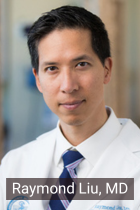
Raymond Liu, MD, is an oncologist, the Director of Research of Hematology-Oncology in Kaiser Permanente Northern California, and Kaiser Permanente San Francisco’s Director of Cancer Survivorship. He also serves as faculty of Kaiser Permanente’s Hematology-Oncology fellowship program and Assistant Clinical Professor at UCSF and at the Kaiser Permanente Bernard J Tyson School of Medicine. Dr. Liu is the co-chair of the ASCO survivorship task force. He is deeply involved in cancer research dedicated to finding new and innovative treatments for people with cancer, and in helping patients and their families lead more meaningful and productive lives. He is always looking for ways to expand KP's research program to support patients’ needs and his focus is on better understanding and improving the patient experience.

Lawrence Kushi, ScD, is the Director of Scientific Policy at the Kaiser Permanente Northern California Division of Research. He is a nutritional and cancer epidemiologist whose research focuses on lifestyle and other factors in cancer survivorship, prognosis and outcomes. He leads the Pathways Study, a prospective cohort study of women diagnosed with breast cancer, begun as an investigator-initiated research grant and now supported through the NCI’s cancer epidemiology cohort infrastructure program. In addition to Pathways and related research, Dr. Kushi leads projects in outcomes of ovarian cancer and adolescent and young adult cancers, and is a co-investigator on other research projects. He also led the NCI-supported Cancer Research Network. A graduate of Amherst College and the Harvard School of Public Health, Dr. Kushi was at the Fred Hutchinson Cancer Research Center, the University of Minnesota and was the Vahlteich Professor of Human Nutrition at Columbia University.
Moderator
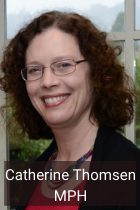 Catherine Thomsen, MPH, joined Zero Breast Cancer in 2014 to promote health and wellness and prevent cancer, after seven years facilitating efforts to engage advocates in cancer research and to fund studies of disparities and environmental risk factors with the California Breast Cancer Research Program (CBCRP). Previously, she was the epidemiologist for the State of Oregon’s environmental and occupational health programs and coordinated an interagency pesticide poisoning prevention program. She received her Master’s in Public Health from Portland State/Oregon Health & Sciences Universities and her BA in international relations from Pomona College. She studied in France and spent more than three years in rural and urban Costa Rica with the Peace Corps and USAID.
Catherine Thomsen, MPH, joined Zero Breast Cancer in 2014 to promote health and wellness and prevent cancer, after seven years facilitating efforts to engage advocates in cancer research and to fund studies of disparities and environmental risk factors with the California Breast Cancer Research Program (CBCRP). Previously, she was the epidemiologist for the State of Oregon’s environmental and occupational health programs and coordinated an interagency pesticide poisoning prevention program. She received her Master’s in Public Health from Portland State/Oregon Health & Sciences Universities and her BA in international relations from Pomona College. She studied in France and spent more than three years in rural and urban Costa Rica with the Peace Corps and USAID.
Thriving and Breast Cancer: What we've learned from the Pathways study
Monday, February 6, 2023
Read the Expanded Q & A with Links Blog
Zero Breast Cancer and Kaiser Permanente Division of Research hosted an hour of experts presenting their findings about diet, nutrition and Vitamin D after a breast cancer diagnosis, followed by 30 minutes of discussion, including answering audience questions.
Larry Kushi, ScD (Kaiser Permanente Northern California Division of Research), Principal Investigator of the Pathways Study, gave an overview of the first 18 years of this ongoing research of breast cancer survivorship. Dr. Kushi was joined by Isaac Ergas, PhD, to summarize what the study has shown about the best diet and nutrition for survivors, and Ijeamaka Anyene Fumagalli, MPH, added details about plant-based diets. Dr. Song Yao, PhD (Roswell Park Comprehensive Cancer Center) presented his intriguing findings on Vitamin D levels and supplementation.
Zero Breast Cancer's Catherine Thomsen, MPH, hosted the Forum and lead the Q&A with the researchers and the Pathways Study participants and others who serve on the Pathways Community Advisory Board. This meeting is for anyone interested, including:
• People diagnosed with breast cancer, including metastatic disease
• Those who care for or know someone diagnosed with breast cancer
• Healthcare providers and social workers serving people with cancer
• Public health professionals and researchers
Featuring

Lawrence Kushi, ScD, is the Director of Scientific Policy at the Kaiser Permanente Northern California Division of Research. He is a nutritional and cancer epidemiologist whose research focuses on lifestyle and other factors in cancer survivorship, prognosis and outcomes. He leads the Pathways Study, a prospective cohort study of women diagnosed with breast cancer, begun as an investigator-initiated research grant and now supported through the NCI’s cancer epidemiology cohort infrastructure program. In addition to Pathways and related research, Dr. Kushi leads projects in outcomes of ovarian cancer and adolescent and young adult cancers, and is a co-investigator on other research projects. He also led the NCI-supported Cancer Research Network. A graduate of Amherst College and the Harvard School of Public Health, Dr. Kushi was at the Fred Hutchinson Cancer Research Center, the University of Minnesota and was the Vahlteich Professor of Human Nutrition at Columbia University.
Isaac Ergas, Ph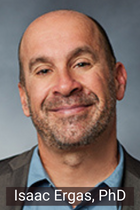 D, is a Staff Scientist at the Kaiser Permanente Northern California Division of Research. His research explores dietary, lifestyle, and behavioral risk factors for breast and bladder cancer, investigating how nutrients, food, and overall dietary pattern levels influence the mechanisms that impact cancer progression and survival. Dr. Ergas earned his PhD in Epidemiology from the University of California, Berkeley. His dissertation examined the role of diet in breast cancer survivorship in participants of the Pathways Study, a longitudinal prospective cohort of women diagnosed with invasive breast cancer between 2005 and 2013. He also holds a Masters of Public Health from the University of California, Berkeley. He previously earned a Masters of Fine Arts in Film and Television Production at the University of Southern California.
D, is a Staff Scientist at the Kaiser Permanente Northern California Division of Research. His research explores dietary, lifestyle, and behavioral risk factors for breast and bladder cancer, investigating how nutrients, food, and overall dietary pattern levels influence the mechanisms that impact cancer progression and survival. Dr. Ergas earned his PhD in Epidemiology from the University of California, Berkeley. His dissertation examined the role of diet in breast cancer survivorship in participants of the Pathways Study, a longitudinal prospective cohort of women diagnosed with invasive breast cancer between 2005 and 2013. He also holds a Masters of Public Health from the University of California, Berkeley. He previously earned a Masters of Fine Arts in Film and Television Production at the University of Southern California.
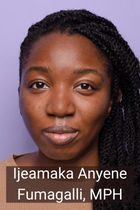
Ijeamaka Anyene Fumagalli, MPH, is a Data Reporting and Analytics Consultant at the Kaiser Permanente Northern California Division of Research. Her work supports the research of Dr. Elizabeth Cespedes Feliciano and she is specifically staffed on projects focused on assessing body composition and its relationship to cancer outcomes and surgical complications. She received her Master’s in Public Health from the University of California, Berkeley and her BA in Environmental Studies from Yale University.
Son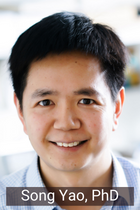 g Yao, PhD, is a Professor in the Department of Cancer Prevention and Control at Roswell Park Comprehensive Cancer Center and the Director of Molecular Epidemiology for CCSG Population Sciences Program at Roswell Park in Buffalo, New York. His primary research area is in molecular and genetic cancer epidemiology, with a special focus on molecular, genomic and immunological characterization in racial/ethnic minority populations to understand how they contribute to cancer disparities in a biopsychosocial theoretical framework with multi-level factors from genetics, society, environment, and healthcare systems. Dr. Yao heads or collaborates on many federal grants; he leads molecular and genomic research on several large population-based studies, including the Women’s Circle of Health Study, the New York Breast Cancer Study, the Pathways Study, and the DiRECT Cohort.
g Yao, PhD, is a Professor in the Department of Cancer Prevention and Control at Roswell Park Comprehensive Cancer Center and the Director of Molecular Epidemiology for CCSG Population Sciences Program at Roswell Park in Buffalo, New York. His primary research area is in molecular and genetic cancer epidemiology, with a special focus on molecular, genomic and immunological characterization in racial/ethnic minority populations to understand how they contribute to cancer disparities in a biopsychosocial theoretical framework with multi-level factors from genetics, society, environment, and healthcare systems. Dr. Yao heads or collaborates on many federal grants; he leads molecular and genomic research on several large population-based studies, including the Women’s Circle of Health Study, the New York Breast Cancer Study, the Pathways Study, and the DiRECT Cohort.
Moderator
 Catherine Thomsen, MPH, joined Zero Breast Cancer in 2014 to promote health and wellness and prevent cancer, after seven years facilitating efforts to engage advocates in cancer research and to fund studies of disparities and environmental risk factors with the California Breast Cancer Research Program (CBCRP). Previously, she was the epidemiologist for the State of Oregon’s environmental and occupational health programs and coordinated an interagency pesticide poisoning prevention program. She received her Master’s in Public Health from Portland State/Oregon Health & Sciences Universities and her BA in international relations from Pomona College. She studied in France and spent more than three years in rural and urban Costa Rica with the Peace Corps and USAID.
Catherine Thomsen, MPH, joined Zero Breast Cancer in 2014 to promote health and wellness and prevent cancer, after seven years facilitating efforts to engage advocates in cancer research and to fund studies of disparities and environmental risk factors with the California Breast Cancer Research Program (CBCRP). Previously, she was the epidemiologist for the State of Oregon’s environmental and occupational health programs and coordinated an interagency pesticide poisoning prevention program. She received her Master’s in Public Health from Portland State/Oregon Health & Sciences Universities and her BA in international relations from Pomona College. She studied in France and spent more than three years in rural and urban Costa Rica with the Peace Corps and USAID.


